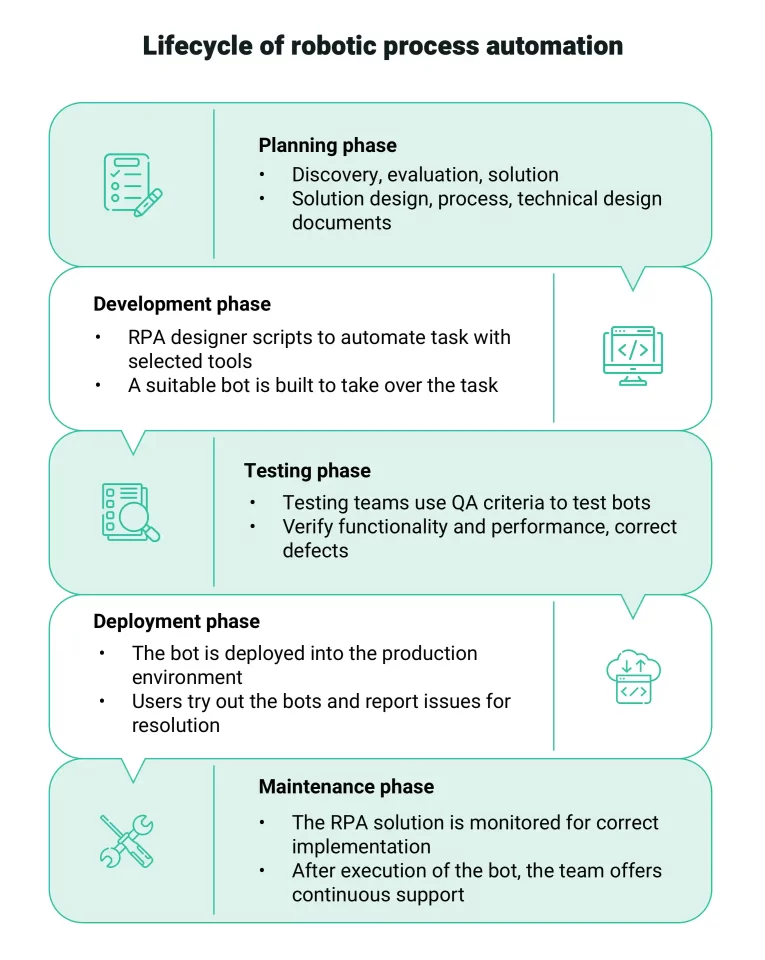INTRODUCTION
Robotic process automation can revitalize the healthcare industry
Robotic process automation (RPA) is the answer for healthcare enterprises looking to improve patient engagement outcomes, manage costs, deliver better working conditions for staff, and carry out enterprise-wide digital transformation. In many cases, the return on investment (ROI) from developing custom RPA solutions is so significant that it frees up vital organizational resources for other mission-critical expenditures.
The US healthcare industry is facing a severe shortage of skilled workers—the American Hospital Association estimates a nationwide shortage of 124,000 physicians by 2033. It will need to hire 200,000 full-time nurses to meet rising care demands.
The COVID-19 pandemic has only exacerbated the issue in recent years. Staff burnout reached an all-time high in 2021, with over 63% of physicians reporting at least one instance of burnout, compared with just 38.2% the previous year.
Unfortunately for many providers, things have not improved in 2022—the healthcare industry ranks lowest among all industries with regard to satisfaction -be it the salary or overall work experience. Many healthcare service providers feel stressed out, overworked, and overburdened by their daily responsibilities.
While the adoption of custom telehealth software solutions and remote patient monitoring or solutions are just a couple of the innovations slowly helping to improve things, it is the implementation of robotic process automation that promises to be the main solution.
RPA uses intelligent digital technologies to streamline core medical operations, administrative, HR, insurance, compliance, and other processes to increase speed, accuracy, and reliability.
In the coming years, the most successful healthcare enterprises will be the ones that embrace digital transformation and leverage automation to make better use of data to deliver better medical outcomes for patients, working conditions for staff, and higher profit margins for investors.
This article explains why the most innovative healthcare organizations deliver custom RPA software solutions.
DEFINITION
What is robotic process automation in healthcare?
Robotic process automation uses rules-based, pre-programmed software agents, devices, and platforms to perform core operational processes across healthcare organizations.
RPA solutions can be integrated into existing software or designed as stand-alone programs. While the word “robotic” often brings to mind an application such as Boston Dynamics’ dog-like mobile agility robot Spot, in most cases, RPA in healthcare does not involve robotics but instead refers to the automation of digital technologies.
The best part about RPA is that these solutions can run 24/7, automatically culling data from disparate unstructured sources and executing rules-based tasks in a highly structured and efficient manner. Robotic process automation allows your organization to move away from time-consuming manual processes and embrace automation to improve efficiency and productivity at scale.
RPA solutions come in all shapes and sizes but orchestrate activities across your technology stack to deliver more seamless and streamlined operations. Intelligent software agents process transactions reliably, without error, and without ever tiring from added complexity. Your RPA solutions will link internal and external IT systems, patient data, and the vital operations driving your organization’s success.
Are you an innovative organization ready to implement RPA solutions?
ELEMENTS
Elements of RPA solutions in healthcare
Robotic process automation solutions are built with key architecture components, including tools, platforms, execution infrastructure, and configuration management.
Your organization’s technology stack: Enterprise RPA is built using programming languages such as Python, .Net, and Java, as well as relational databases and front-end technologies like JavaScript. You can develop custom RPA solutions by improving or adding new applications to your healthcare tech stack.
Business intelligence: Your RPA solution integrates disparate datasets across different departments to deliver actionable insights to propel accurate business intelligence. You can bring all the other pieces of information together with a custom system that fuels cross-functional collaboration in pursuit of excellence and shared goals.
Holistic and dynamic: RPA solutions in healthcare are multi-layered and comprise feature recorders, extensions, bots, robot control units, and development studios. Recorders allow bots to learn about human interactions with software. Extensions allow bots to extract and make data usable across different elements of the tech stack. Control units serve as an admin panel to control functions, and your development studio is where all automation is managed from a single dashboard.

The SDLC of RPA may be customized for specialized solutions
EXAMPLES
Examples of RPA use cases in healthcare
RPA healthcare software development can be customized to handle just about any task required by any department across the healthcare enterprise.
Here are a few examples of RPA use cases in clinical healthcare practice environments:
Revenue cycle management: From authorization, coding, and remittance to everything else, RPA is the answer to optimizing your organization’s revenue cycle to ensure long-term profitability gains.
Medical claims processing: US patients and medical providers pay an estimated $496 billion in billing and insurance-related or BIR costs annually. RPA cuts the time it takes to process medical claims from 85 seconds on average to under three seconds or less. Many systems are so fast that they can dramatically improve insurance claims’ reliability and accuracy, leading to 30% in costs and the opportunity to automate more than 70% of all activities connected to medical claims processing.
Supply chain harmonization: Healthcare supply chains are large and often unwieldy due to how many moving pieces, vendors, compliance obligations, and other details are involved. RPA delivers a culture of continuous quality improvement by measuring, evaluating, and optimizing supply chain functions in real time.
Business intelligence and forecasting: Data-driven decision-making is transforming healthcare at scale, but the key is integrating all the different data streams your organization generates. RPA breaks down barriers and creates the foundation for incorporating organizational data.
Healthcare technology stack integration: An RPA can help clean up your organization’s administrative processes by better integrating clinical, operations, HR technologies, and resources.
Payment processing: RPA in healthcare enables claims management systems to be queried alongside medical coding systems to expedite payment processing services’ accuracy and reliability. RPA and artificial intelligence, or AI as it is popularly known, automate data aggregation and optimize payment processing.
Data-entry, migration, and governance: Data governance is a front-of-mind priority. Achieving success requires more than simply a better approach to training staff— you also need to automate key data processes to unlock enterprise value and reduce human errors.
Appointment scheduling: In 2019, before the COVID-19 pandemic, more than 88% of patients booked appointments using time-consuming manual processes. Missed appointments cost providers up to $150 million annually. Today, automated appointment scheduling services are becoming the gold standard as patients and providers embrace telehealth.
Compliance documentation: As healthcare organizations have embraced digital transformation, they have found themselves in the crosshairs of criminal organizations. RPA offers clear benefits for improving cybersecurity and enhancing data management activities to safeguard personal health information or PHI. Role-based access controls can be programmed directly into RPA business logic to ensure healthcare software compliance standards are upheld every time.
Robotic process automation is a game changer that offers measurable advantages for every department and practice specialty across the healthcare industry. Improving speed, reliability, and accuracy, matched with increases in worker retention metrics and patient satisfaction, make RPA investment a potent form of business transformation.
Want customized RPA software solutions to reduce the burden of your healthcare stuff?
BENEFITS
Benefits of robotic process automation to transform care delivery
Here are some of the benefits that the early adopters of RPA enjoy:
- RPA increases operational efficiency without increasing labor costs, which often account for more than 60% of hospital budget costs.
- Human workers can focus on more beneficial tasks by shifting monotonous activities to robot agents.
- RPA solutions are low-cost and do not require specialized IT knowledge to deliver robust automation.
- Automated process automation tools increase knowledge sharing and cross-functional collaboration.
CONCLUSION
How does RPA drive digital transformation to make your healthcare organization more competitive?
Right now, your clinical care teams, administrative staff, and executive decision-makers are wasting valuable time completing simple, repeatable tasks using paper-driven manual processes.
Robotic process automation drives competitive advantage by reducing the need for your top talent to waste valuable time and human capital on these inefficient activities.
Top enterprises are innovating across the medical practice landscape by delivering custom software solutions to automate, optimize, and streamline core tasks. RPA empowers your teams to stop wasting valuable time handling jobs better suited for software.
The future is bright for healthcare enterprises that can trim the fat, lean into tough challenges, and deliver accurate healthcare management software solutions to transform their practice environments.
Change is never simple or easy, but implementing robotic process automation is a powerful method of driving digital transformation to unlock a more agile and resilient enterprise.
Instead of continuing to do things the old way, it may be time to do them the smarter way. RPA can help.






